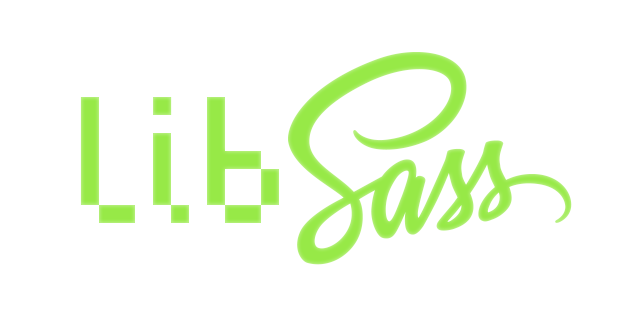LibSass
LibSass was an implementation of Sass in C/C++, designed to be easy to integrate into many different languages. However, as time wore on it ended up lagging behind Dart Sass in features and CSS compatibility. It reached its end of life in October 2025. any legacy projects still using LibSass or its wrapper libraries like Node Sass should migrate to Dart Sass.
Migrating AwayMigrating Away permalink
LibSass stopped receiving feature updates before Dart Sass even launched, and it had a number of known incompatibilities with the Sass specification. Since then, Sass has grown and evolved to support the latest CSS features, so projects still using LibSass will unfortunately have some serious catching up to do.
The following are the biggest known differences:
-
LibSass only supports
@importfor loading files. Although Dart Sass versions through the 2.x will continue to support@import, it’s deprecated in recent versions, and we recommend all code move to@useinstead. The Sass migrator can automatically migrate projects from@importto@use. See /d/import for details. -
LibSass uses
/for division. Dart Sass 1.x does as well, but Dart Sass 2.x will use it as a list separator, so using it for division is deprecated. The Sass migrator can automatically migrate projects from/to the newmath.div()function. See /d/slash-div for details. -
LibSass parses custom properties like any other CSS property. Dart Sass parses them the same way it parses at-rules, as plain CSS except where SassScript is injected using interpolation. See /d/css-vars for details.
-
LibSass supports
@extendrules with complex selector targets, like@extend .foo.bar, using semantics that don’t match the way@extendis defined to work. These are not supported in Dart Sass. See /d/extend-compound for details.
WrappersWrappers permalink
LibSass was just a library. To run the code locally (i.e. to compile your stylesheets), you also needed a wrapper. Below are the LibSass wrappers that we’re aware of having excited. Sometimes there are multiple wrappers per language—in those cases, we put the most recently-updated wrapper first.
⚠️ Heads up!
Like LibSass, these wrappers are end-of-life. They may not have compiled versions that are up-to-date with the most recent LibSass release from its sundown window.
-
Sass C
SassC (get it?) is a wrapper written in C.
To run the compiler on your local machine, you need to build SassC. To build SassC, you must have either a local copy of the LibSass source or it must be installed into your system. For development, please use the source version. You must then setup an environment variable pointing to the LibSass folder, for example:
export SASS_LIBSASS_PATH=/Users/hampton/path/libsassThe executable will be in the bin folder. To run it, try something like:
./bin/sassc [input file] > output.css -
Crystal
sass.cr is a LibSass wrapper for the Crystal programming language.
-
Go
go-libsass has the most active GoLang wrapper. gosass is another LibSass wrapper.
C6 is a Sass 3.2 compatible implementation written in pure GoLang that aims to extend Sass. wellington/sass is an in-progress pure Go Sass lexer, parser, and compiler.
-
Java
There is one Java wrapper — jsass. There is also a plugin for Maven — LibSass Maven plugin.
-
JavaScript
The sass.js project makes LibSass available as pure JavaScript. There’s a way to test it in the browser, too.
-
Lua
The Lua wrapper is found at lua-sass.
-
.NET
LibSass Host is updated regularly, and is probably the best bet. There’s also libsass-net or NSass, although they haven’t been updated in a while.
-
Node
The node-sass project has proven to be popular, and we’ve taken it into the main Sass GitHub repo. Check out its package page here, and there’s a dedicated twitter account for updates.
-
Perl
The CSS::Sass project is updated regularly. There’s the Text-Sass-XS project, too, although it hasn’t been updated in a while.
-
PHP
The SassPHP project is an updated fork of an older PHP version.
-
Python
The libsass-python project is updated regularly. There are more details on its own website.
Three other Python projects, python-scss, pylibsass and SassPython, haven’t been updated in a while.
-
Ruby
LibSass has also been ported back into Ruby for the sassc-ruby project.
-
R
The R Sass package wraps LibSass with additional caching and bundling methods. Extended documentation.
-
Rust
The
sass_rscrate is a LibSass wrapper and is updated regularly. -
Scala
The only Scala project, Sass-Scala, hasn’t been updated in a couple of years.
About LibSassAbout LibSass permalink
This project was the brainchild of Hampton Lintorn-Catlin, the original creator of Sass. Aaron Leung was the initial primary developer, and Michael Mifsud and Marcel Greter were the primary developers for its latter years.
